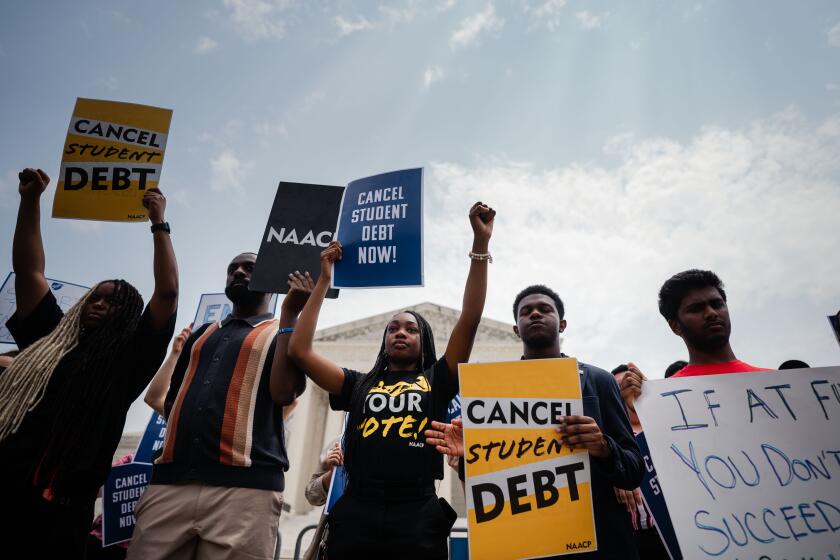Supreme Court keeps on hold Biden’s scaled-down plan to reduce student loan debt

- Share via
WASHINGTON — The Supreme Court on Wednesday kept on hold a plan by President Biden to reduce student loan monthly payments for millions of borrowers and cancel loans after they have been paid on for 20 years.
In a brief order with no dissents, the justices denied an emergency appeal from the administration and said it would wait for a further ruling from a U.S. appeals court in St. Louis, which blocked Biden’s plan from taking effect.
“The court expects that the court of appeals will render its decision with appropriate dispatch,” the order said.
The decision is at least a temporary setback for the administration, and it suggests the court’s conservatives remain skeptical of Biden’s assertion that the president has the authority to reduce outstanding student debt by hundreds of billions of dollars.
Republican attorneys general from Missouri and 10 other states had sued to block Biden’s latest plan, arguing it was extraordinarily costly and went beyond what the law allowed.
They won rulings in June from district judges in Kansas and Missouri. In early August, the 8th Circuit Court in St. Louis issued a nationwide order forbidding the Education secretary from taking any further steps to “forgive approximately $475 billion in federal-student-loan debt.”
Two weeks ago, Solicitor Gen. Elizabeth Prelogar urged the high court to lift that order or to narrow its scope.
She said the policies adopted by the Education Department adjust a borrower’s payments based on their income and allow for loans to be forgiven after 20 years. She said these provisions have been part of the Higher Education Act for decades.
But the justices instead left the nationwide order in place for now.
Last year, the court in a 6-3 ruling struck down a Biden plan to forgive millions of student loans as a response to the COVID-19 pandemic.
The administration had relied then on a law passed at the time of the Iraq war that authorized education officials to “waive or modify” the loans of people who were affected by the war or a national emergency.
The justices said Congress had not authorized a “mass debt cancellation program,” one that was projected to cost the government $430 billion.
The Supreme Court has ruled that President Biden does not have the authority to forgive millions of student loans.
Disappointed but undeterred, Biden said he would look to other education laws that would allow him to reduce or forgive outstanding loans for borrowers who were struggling.
In April, the White House announced a new set of student debt relief plans that would save about 30 million borrowers billions of dollars in total.
One of those programs, dubbed SAVE, would reduce payments for 8 million borrowers, leaving 4.5 million of them with a monthly payment of $0. It was originally projected to cost the government about $180 billion, but the total has grown since then because tens of thousands of other loans were included.
While the revised plan reduced payments instead of canceling loans, it would cost the government even more because it extended help to many more borrowers.
“The Supreme Court tried to block me from relieving student debt. But they didn’t stop me,” Biden told a rally in May. “I’ve relieved student debt for over 5 million Americans. I’m going to keep going.”
A coalition of 11 Republican state attorneys sued, alleging Biden had again overstepped his authority. And in late June, federal judges in Kansas and Missouri, both of them Obama appointees, blocked different parts of the Education Department’s new programs.
“The SAVE Plan is a transformative expansion in regulatory authority” and would cost the government $475 billion over 10 years, said U.S. District Judge Daniel Crabtree in Kansas City.
More to Read
Sign up for Essential California
The most important California stories and recommendations in your inbox every morning.
You may occasionally receive promotional content from the Los Angeles Times.












